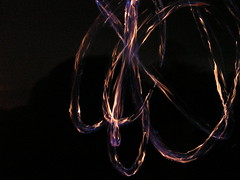The firedancing and poi last night at the geek dinner were great, but I noticed that they were even better through my camera lens, and especially through Jen’s camera lens. I wanted to watch it all through her camera and not through my own eyes. Not for the first or last time, I thought of Paul Feyerabend’s “Against Method” in which he lays out the history of our perceptions of reality and how science and epistemology considered lenses. In other words, when telescopes and microscopes were new, it was controversial to treat whatever you saw through them as an empirical fact. Now we take this for granted – that what we see through an electron microscope is real and true.
I like having glasses (rather than getting eye surgery to correct my vision) because it is a constant reminder that my reality (as judged by what I see) can change easily and abruptly. Well, I suppose that being able to open and close one’s eyes could serve as the same reminder. But my vision of a face can be blurry if I peek over my glasses – so blurry that I realize much of my recognition of a person is not in their face but is in their posture and movement.
How does this relate to books, writing, poetics? Can we adopt different visions of a text, and think, “With these glasses on, the book or poem reads this way. Without them, it’s another way.” Yes. The trick would be articulating what kinds of lenses we’re using at particular moments.
Another trick: this blog is a filter or a lens exposed to public view. I was thinking all this quite clearly while standing on the porch last night, but it’s hard to kick the conversation up to this level in person while it’s happening – it could potentially bore people or be a monologue hard to absorb. So it becomes less socially offensive on paper or blog. It gets to be a snapshot of a moving thought just like the snapshot of the moving fire makes a beautiful pattern not visible in the moment as we experience moments linearly. Possibly I’ve just had a dumb epiphany about the wonders of the paragraph.
